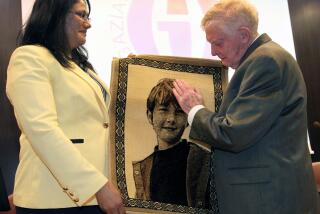Legal Fight ‘Was Hard on Us and the Children’ : Couple Finally Win Right to Their Son
- Share via
It took Glenn and Gayle White three years and $24,000 in legal fees, but on Wednesday the Irvine couple finally convinced the State of California of their love for their son.
The Whites watched a judge sign an order decreeing them the parents of 3-year-old Glenn, ending a custody fight with the boy’s natural father that reached the state’s highest court and eventually strengthened the rights of adoptive parents.
“I think we cried more this morning than we did anytime through this whole ordeal,” Glenn White said. “It was a great feeling. We can now go on and concentrate on our children and our family.”
In a case that the Whites’ lawyer, Christian Van Deusen, called an adoption that “went upside down,” the natural mother had agreed that the boy be turned over to the permanent custody of the Whites in 1983.
Natural Father Filed Challenge
The baby was born of a liaison between a couple identified in court records only as Michael U., then 16, and Jamie B., then 12.
But Michael, who had never met the child, challenged the adoption. He relied on a 1984 California Supreme Court ruling that assumed a biological father had a right to custody and a right to block the mother’s decision to put the child up for adoption, and expressed an overriding belief that the baby would benefit.
The Whites lost their cases in superior and appellate courts, but prevailed last September before the California Supreme Court. The justices cited several reasons why it would be detrimental to place the child with the biological father, ranging from his youth to his poor school performance.
One justice, Stanley Mosk, wrote that Michael “was legally a rapist” for having sex with a 12-year-old girl, and argued that the father should have no say in the adoption.
Still, the high court did allow Michael to press the fight and attempt to prove that his custody would not be detrimental to the child. On Jan. 10, Orange County Superior Judge Myron S. Brown found that Michael had failed to do so and ruled that his consent was not necessary, thus clearing the way for the formal adoption Wednesday.
‘Maybe Opened a Door’
“It was tough to stick it out,” said White, a firefighter for the City of Colton in San Bernardino County who has another adopted child, a 5-year-old daughter. “It was tough to deal with it. It was hard on us and the children spiritually, mentally and financially.”
White added that he feels proud to have pressed the case and “maybe opened a door that was closing.”
Attorney Van Deusen, who in 1978 began a three-year fight of his own to keep custody of one of his two adopted daughters, said the Whites were “in absolute turmoil” when they first lost in court in 1984.
“Their lives were upside down,” Van Deusen said. “They saw the kid as if he was terminally ill . . . there’s a constant threat of loss.”
Van Deusen added that the Whites’ victory last year was a move by the high court to protect the best interests of the child in such cases, while “balancing” the rights of adoptive parents versus those of biological parents.
White said his son “feels what’s going on, but I don’t think he understands. During the worst of times, he was aware of it; it had an emotional effect on him.
“In court today, even though he couldn’t understand, he knew he was among . . . friends of mommy’s and daddy’s,” the father added.
Gesture of Appreciation
The Whites had one final request of Superior Court Judge Jack K. Mandel on Wednesday. The adoption decree lists their son as Glenn Christian White, with the middle name being a gesture of their appreciation for their lawyer.
“We want Glenn to know and remember when he’s old enough to understand,” White explained.
And for couples who want to adopt but encounter obstacles, the father offered this advice:
“The first thing is, don’t take anything for granted. In this state, the adoption laws are so ambiguous that any judge can use his own personal interpretation of the law, and make whatever decision he wants and make it sound reasonable.
“The other thing is, don’t give up.”
More to Read
Sign up for Essential California
The most important California stories and recommendations in your inbox every morning.
You may occasionally receive promotional content from the Los Angeles Times.












